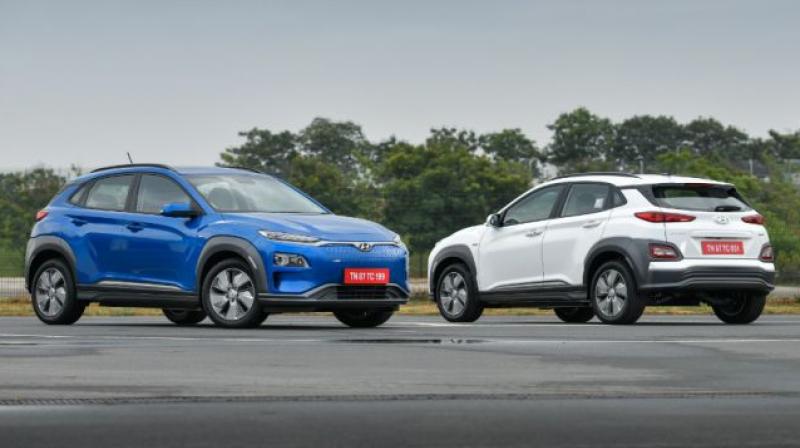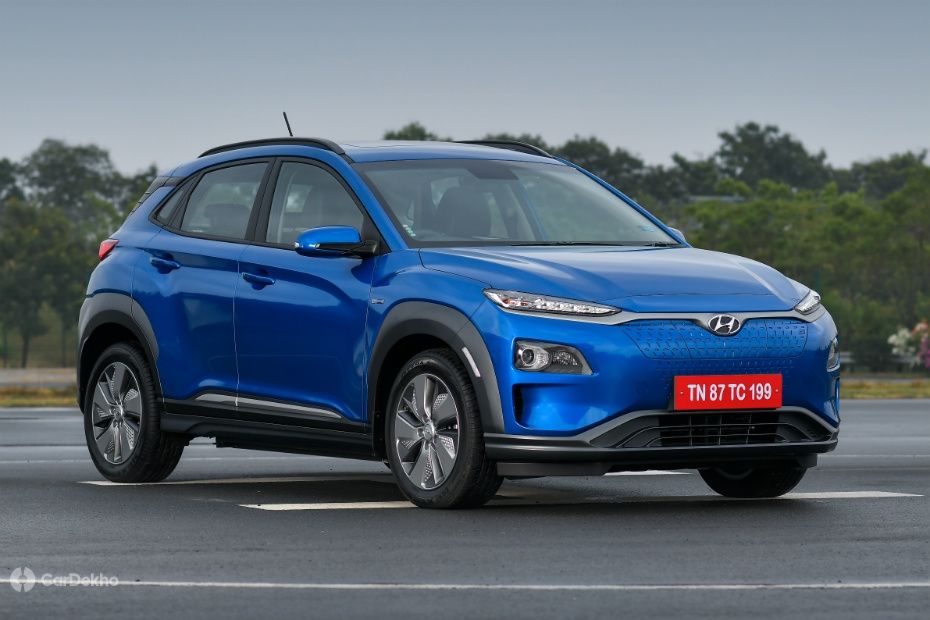Hyundai Kona Electric in detailed pictures
Explore India’s first long-range eco-friendly EV in this detailed gallery.

The Hyundai Kona Electric has just been launched in India with a price tag of Rs 25.30 lakh (ex-showroom, India). It is the first long-range electric vehicle to be launched in India with a claimed ARAI range of 452km on a full charge. Internationally, it is offered in two battery variants - 64kWh and 39.2kWh, and India only gets the latter. You can read the details regarding the battery and its charging time here.
While you await our first drive review of the Kona Electric in India, let’s take a detailed look at this electric SUV in the images below:

In terms of size, the Kona sits between the Venue and Creta. It measures 4180mm long with a 2600mm wheelbase, 1800mm wide and 1570mm tall.

As an EV it gets a specialised front grille that improves aerodynamics and is the same colour as the body. It does feature a brushed metal bar above the grille that houses the Hyundai logo.

The Kona’s split-design LED headlamps are on the bumper while the LED DRLs are positioned above, along the edge of the hood. These headlamps also feature auto-levelling function with cornering lamps too.

More importantly, the charging ports for the Kona Electric are housed behind a panel on the right side of the front grille.


The top port is for the wall mounted AC charge box while the DC fast charger design uses the whole socket.

Hyundai also offers a small portable charger for the Kona Electric that can be plugged directly into a regular wall socket.

From the side profile, the Kona EV can be seen with its extra grey cladding on the wheel arches and side skirts. It also comes with roof rails, windowlines and aerodynamic inserts flanking the rear windscreen in black.

Around the rear, the Kona gets LED wrap-around tail lamps. It also has a roof-spoiler with a high mounted stop light. The rear fog lamps are housed in the grey cladding just above the rear bumper. It also has a rear skid plate.

Hyundai has fitted the Kona Electric with 17-inch alloys specially designed for better aerodynamics. Better aerodynamics reduce drag and thereby increase the range of the EV.

The cabin of the Kona Electric has a relatively traditional design layout with an all-black interior and leather upholstery. It features a metallic silver finish for the central console.

The driver’s seat is 10-way electrically adjustable, while both the front seats offer ventilation and heated functionality.

It has a 7-inch digital instrument cluster with the speedometer dial in the centre. The left flank has all the warning lights and the corner shows how much power is being used and how much is being charged while driving. On the right of the dial there is a section for various information including the tyre pressure monitoring system with the right corner showcasing the total battery charge left.

The Hyundai Kona’s powertrain uses a 100kW electric motor with a shift-by-wire single speed transmission. This is the section of the central console for the controls to switch between the following - park, neutral, reverse and drive, with the electronic parking brake below it. The front cupholders are to the left of this control panel.

The panel at the bottom of the central console has the controls for the heated and ventilated front seats, auto hill hold and the four driving modes (Eco, Eco+, Comfort and Sport).

At the top of the console tunnel, there is a lid that covers the wireless charging pad, USB port and AUX port too.

There is a small storage section under these controls, accessible from the driver’s seat.

Atop the dashboard, the Kona Electric features the infotainment system with a 7-inch touchscreen display. It features Android Auto and Apple CarPlay compatibility as well as displays various EV functions. The steering mounted audio controls are on the left of the steering wheel.


The Kona Electric gets shift paddles to control the level of regenerative braking. The left paddle increases it and vice versa from the right paddle.

It also gets a sunroof.


The rear seats get a headrest for all three passengers and can be split-fold 60:40.

The Kona Electric’s motor produces 136PS of power and 395Nm of torque.

It can go from a standstill to 100kph in just 9.7 seconds says Hyundai.
Also read: How Much Do You Stand To Save On An EV After GST Reduction?
Disclaimer: This article has not been edited by Deccan Chronicle and is taken from a syndicated feed. Photos: CarDekho.

